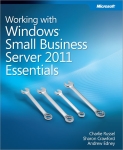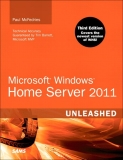Home Servers In The Digital Age
Home Servers In The Digital Age is a new 14 page PDF document by J.P. Gownder and Forester Research and is full of amazing facts and figures like:
- Home Servers will fill a critical need in the digital home
- Home Servers will enter 4.6 million households by 2012
- Early Adopters Will Be Found Among The Price-Insensitive
- Home Server Adoption Will Start Slowly
Consumers’ growing digital assets in the form of music, photos, and video will require backup, management, and streaming. In multiple-PC households, complexity has grown, while backup behavior has stalled. Home servers can address these concerns and can also act as hubs for the digital home, streaming content across PCs and into the living room itself. While the need for home servers is clear, articulating their value proposition to most consumers will be very difficult. Technology marketers must overcome consumers’ ignorance and significant retail challenges to overcome some very high marketing hurdles. Expect Microsoft’s launch of Windows Home Server in 2008 to raise awareness and give a jolt to adoption of this product. But it will take a long time for the home server market to take off. Forrester’s forecast suggests that home servers will become an important product category for the digital home by 2012.
Available for download from here.
Share this WHS Article with Others:





I’ll put this in then let the MS haters have at it…
Regardless of capability, MS getting into this market, validates the market, and means growth across the sector, not just MS branded OEM market. It means hobbyists with more technical prowness will start looking at the OSS solutions, OSS developers will start working on squashing Bug #1, and pretty much the winner is the consumer.
Sure the OSS community has been playing around in this space for a while, but MS taking it and making it an off-the-shelf take it home plug it in type of appliance makes the space more visible.
/me lights match
“Technology marketers must overcome consumers’ ignorance and significant retail challenges to overcome some very high marketing hurdles” so states this Microsoft report.
Even Microsoft wants to bash it’s own customers!
There is NO reason why anyone would need a home server, that is a separate appliance device, just to serve and stream files. Your PC client can do that now.
And as for backup, there’s a prolific amount of choices in the marketplace just for that purpose already, without the need of having to spend hundreds of dollars to do this with a server.
The question is, does the consumer want and need a centralized storage device? Obviously, all those individuals using just one PC client isn’t going to need this type of device.
For the rest, it’s only a question of what actually plays fair, so we can stream, share and backup as we need and want?
WHS still doesn’t even allow you to backup a copyrighted DVD movie, having been purchased. No time shifting, and no playing back on different formats which are needed for different devices.
Imagine buying a book, and being told, you can only read in in our room, when we are open for business. That what WHS is like, as it only supports it’s own brand and proprietary source code! There’s no freedom, no democracy, just usual draconian stipulations by the EULA.
Consumers is another bad label for the public too. People are not machines purchasing products, their individuals making choices, seeking solution to their problems.
The FACTS remains, what can WHS do to provide solutions, NOT how ignorant consumers are Microsoft. Why do you think more individuals use Google, instead of your
LiveSearch… Because, people are smarter than you give them credit.
oh its been a while since I’ve gone post parsing…
Not a bash, if the technology as it currently exists was easy those Buffalo TerraServers would fly off the shelf, but even the one button back up USB solutions aren’t flying… and a home server will never be a general purpose OS, totally different market.
Yes your PC client or laptop can.. and its a single point of failure, remember that when your laptop falls jamming the heads into the platters and rendering useless the 40GB of photos, music and videos you’ve accumulated. Enjoy.
Dude make up your mind, either there is a market, or there isn’t a market. Are you saying there is a market for a backup solution? Good. I’ve tried other backup solutions, they all work great. And WHS works the best of the ones I’ve tried. Saved me after the aforementioned hard drive crash. Glad I spent the money for WHS.
WHS doesn’t even back itself up. The same hard drives Jon takes about failing are no less the very same issue in WHS!
And WHS isn’t advertised only as a backup appliance, note even the name isn’t “Backup Server” it’s called Windows Home Server. A server that doesn’t function, unless you are willing to allow the fundamentally flawed in WHS Drive Extender code, that has a proven design flaw (KB 946676) leading and causing data corruption with just about every Microsoft software application used by home users and then some.
You would think Microsoft would have higher standards of testing it’s own software, right? Especially since this was reported by outsiders in the beta testing phase. Of which, Microsoft has promised to work around the clock, even stating the WHS Team developers wouldn’t rest until done in December of last year. So by all means tell everyone how “Great” WHS is, knowing it doesn’t even have any resolution of it’s design flaws which are not even expected to arrive for customer relief until no sooner than June 2008.
Mean while, the home server market has been doing just fine, as more improved products are continuing to be offered, without any help what’s so ever from Microsoft. In fact, Microsoft’s broken Home Server only stands out in the Media more for having shortcomings and for being broken with a fundamental proven design flaw.
Eric Rux examines the problems plaguing WHS
community.winsupersite.com/blogs/paul/archive/2008/03/21/more-on-the-windows-home-server-data-corruption-issue.aspx
Microsoft struggles to fix data corruption bug in WHS – MVP
blog.stevesinchak.com/article39236.aspx
Microsoft Has a Broken Home
http://www.technewsworld.com/story/60986.html#
3377 Windows Home Server Bugs – WHS Team Blog
blogs.technet.com/homeserver/archive/2007/03/22/entomophobia.aspx
It’s obviously, WHS has many issues, serious issues and shouldn’t even be sold to the public, until at least WHS data corruption proven design flaw is repaired.
I think this data corruption problem has been underplayed, maybe because very few people have actually purchased a WHS. It’s a serious problem that’s gone on way, way too long. Corrupting data is just about the worst thing a backup device can do. WHS is currently a very *bad* thing, and I couldn’t in good conscience recommend it to anyone.
The worst part about WHS data corruption is not knowing, & not having an easy way of finding out, whether/if any of my files were corrupted (short of testing them one by one) or whether they’re all fine.
Who would feel happy about that when using WHS with a proven design flaw?
Yeah.. there is the haters…
None of whom have tried the system, but are sure its failed…
head on over to the forums and the user communities and poll who’s been bitten by the corruption bug… (very very few)…
but man oh man are there people that like to blast it.
On the comment that hard drives fail. hurrah, you get it.. and WHS has a process where if the system partition fails, a reinstall will identify the other hard drives and rebuild the shares, and the backups. Wow.. just like other backup systems on the market.
Now if you want to bash it go on.. but if you haven’t bought it, or tested it, can you even truthfully say if it works or not?
Here’s another example of why Microsoft failed to deliver as advertised and promised…
Consider how HP’s Windows Home Server products has been named/marketed as a ‘MediaSmart Server’. It was built on MS Windows SERVER 2003 technology. To imply on this and other threads that it was never meant to be more than a backup device and that problems occurred when they tried to add other features (such as becoming a FILE SERVER) is wild speculation at best and at worst, is simply… WRONG.
and then there is…
“A bug has been discovered in the redirection mechanism which, in certain cases, depending on application use patterns, timing, and workload, may cause interactions between NTFS, the Memory Manager, and the Cache Manager to get out of sync. This causes corrupted data to be written to files.” – Microsoft KB 946676
Microsoft’s internal quality bars suck! Plain and simple.
This is a clear case of using confusing or overwhelming somebody by giving an impenetrable explanation using technical terms and concepts.
Customers bought a product called Windows Home Server that does not work properly, period. Customers deserve reparations!
Especially, when Windows Home Server has the capacity to hose your data. For an OS, that’s bad, but for a filer server OS, that’s a disaster.
Microsoft’s biggest lemon – Windows Home Server
blogs.zdnet.com/hardware/?p=1499
More Proof as why Microsoft isn’t delivering…
MSDN, TechNet, and Volume licensing customers are paying Microsoft good money to get small services like beta and final builds before the public sees them. One might think that Microsoft would not make the same mistake twice, but…
What does Microsoft do, delay even until after the public gets XP SP3 RTM by two days later, despite torrents offering the service pack to the world. This trend of Microsoft not rewarding its more loyal customers is a little worrying.
And then there is another FACTUAL reason to avoid Microsoft products, especially Windows Home Server. As of August 31 of this year, Microsoft’s “Plays for Sure” technology — once codenamed Janus — will no longer play for sure — unless, that is, users play back the tunes on the same computers and OS forever.
How can this be what customers want?
And to think Microsoft claims it’s customers are ignorant and need education, how about Microsoft itself?
How is it that Microsoft blew away the golden opportunity that later Google picked up?
It’s also ironic that when Windows first came out, without a browser, Gates didn’t even see the Internet as an opportunity. Then Microsoft stoled the works of another to include a browser, and didn’t pay that business, as Microsoft instead offered it for FREE.
It’s impossible to even listen to you Microsoft DRM music on all WHS’s PC Clients, because first and foremost, WHS only supports 10 PC clients, but Plays For Sure DRM technology has allowed ex-MSN Music subscribers to switch authorization to new machines and OS, so long as they keep abiding by a previously imposed limit of five computers.
So WHS 10 PC Clients – 5 DRM = 5 WHS that will NOT play for sure…
And YES, this is all from Microsoft, the same corporation that demands after purchase activation of your product, then validation of your activation product and again every time thereafter upon Windows Update…
Aren’t you tired of being treated like a crinimal by Microsoft?
Just because Microsoft was behind it, many people assumed that at least Microsoft would keep supporting it. Well, you’ve now learned your lesson. Plays for Sure was so bad that Microsoft didn’t even use it for its own Zune digital media device. Along with that, Microsoft shut down its failed online music store, and now for the kicker, it’s telling anyone who was suckered into buying that DRM’d content that it’s about to nuke the DRM approval servers that let you transfer the music to new machines.”
There isn’t anyone that could be happy about that!
It’s the same with Vista DRM.
See A Cost Analysis of Windows Vista Content Protection, written by Peter Gutmann.
http://www.cs.auckland.ac.nz/%7Epgut001/pubs/vista_cost.html
Windows Vista includes an extensive reworking of core OS elements in order to provide content protection for so-called “premium content”, typically HD data from Blu-Ray and HD-DVD sources. Providing this protection incurs considerable costs in terms of system performance, system stability, technical support overhead, and hardware and software cost. These issues affect not only users of Vista but the entire PC industry, since the effects of the protection measures extend to cover all hardware and software that will ever come into contact with Vista, even if it’s not used directly with Vista (for example hardware in a Macintosh computer or on a Linux server). This document analyses the cost involved in Vista’s content protection, and the collateral damage that this incurs throughout the computer industry.
Flawed WHS – My WHS happily serves non-DRM’d files in various formats. Recommend you purchase your music and media in that format. I recommend Amazon for DRM free MP3s. Also you can rip your CD collection to DRM free copies using various applications. None of which have anything to do with WHS, and neither does your post.
Lucy L. – The topic is HomeServers not Vista. Perhaps you’re commenting on the wrong post? DRM and content protection is messed up on a variety of platforms and mostly the fault of those that produce the media and how they allow it to be distributed.
@Jon
My two sons both bought a Microsoft Zune player, and it does use Microsoft digital music using DRM. It’s NOT possible to share these paid for music collections on WHS or for that matter any other PC, thanks to Microsoft.
Telling everyone NOT to purchase Microsoft DRM music, is a bit late, and after the fact.
What format are you telling your teenagers whom happen to want all the latest cool tech products? No Zune player too? Is that what you’re suggesting?
Why shouldn’t Microsoft products like WHS work with Microsoft’s own music, when purchased from Microsoft using Microsoft Zune (music player)?
Promises were made, advertising claiming it “Plays for Sure” and yet Microsoft totally didn’t keep it’s promise.
Microsoft doesn’t play for sure, even on it’s own devices (Zune) or Micosoft’s own operating systems without the authorization from Microsoft servers which everyone knows by know beginning August 2008 are all being taken down by Microsoft.
So on what device will Microsoft music using DRM actually play for sure without getting authorization keys? Nothing!
Who wants to tell every child, why Microsoft is preventing them from listening to their paid for songs? Do you have children? Want to explain what “Plays for Sure” means, and how Microsoft stole their money?
Oh my darling son, it’s all true, Microsoft sold you music that you’re NOT going to be able to listen anymore, that is unless you NEVER play it on any other device ever again, for the rest of your entire whole life and all your children and their children.
Just so Microsoft could sell the same songs again, on different formats, which it owns, so it can pull the plug again too.
No thanks… NEVER again anything to do with Microsoft! I’m now an official basher, and PROUD of it.
Boycott Microsoft, switch over to FREE open source code like Linux! It works, no activation required or needed.
@hans – So there are no other players to buy except Zunes? c’mon, blaming Microsoft for your buying decsions is silly and stupid. The $40 buck MP3 knock-off will play anything. I haven’t bought an iPod or a Zune, BECAUSE I don’t want a DRM locked player. And again, nothing to do with WHS.
@ Terri and Ginger: Play4Sure isn’t WHS. WHS is a repository for files. I don’t mind you ranting on P4S, or any DRM. But that really has nothing to do with WHS. I’m with you on OSS, and non-DRM stuff. If Ubuntu ever makes something that makes adding drives, simplifying backups and managing shares as simple as WHS, I’d try it and possibly migrate to it. But right now, too many hours in setting all those features up in a plain vanilla linux box. more power 2 ya though.
“Plays for Sure” is Microsoft’s strategy of using DRM to prevent digital music and video content from experiencing fair play.
Windows Home Server is a Microsoft product that will NOT let Microsoft customers play back their DRM purchases as of August 31 of this year, Microsoft’s “Plays for Sure” technology — once codenamed Janus — will no longer play for sure — unless, that is, users play back the tunes on the same computers and OS forever.
Is it any wonder why everyone regards Janus as just “Anus”!
Digital Home Servers MUST have two important qualities…
1) No DATA CORRUPTION, which WHS has a proven data corruption design flaw known as Microsoft KB 946676
2) Best Security, NOT ‘Hundreds of thousands’ of Microsoft web servers being hacked…
blogs.guardian.co.uk/technology/2008/04/27/hundreds_of_thousands_of_microsoft_web_servers_hacked_fail.html
F-Secure, which has a very solid reputation in the security community, reckons that more than half a million Microsoft servers have been hacked.
essentially what happened was that the attackers looked for ASP or ASPX pages containing any type of querystring (a dynamic value such as an article ID, product ID, et cetera) parameter to circumvent.
Another reason to NOT use and avoid Microsoft ASP.NET.
What the news articles aren’t telling you is that poorly coded web applications are more at fault than any single IIS vulnerability. Any web application that accepts input but doesn’t sanitize it against SQL injection – be it written with ASP, ASP.NET, PHP, CF, etc. – on any platform – Apache, IIS, etc. – is at risk, and indeed seems to be the actual vector of attack in the infections being reported.
But of course the convenient and popular thing to do is to blame Microsoft.